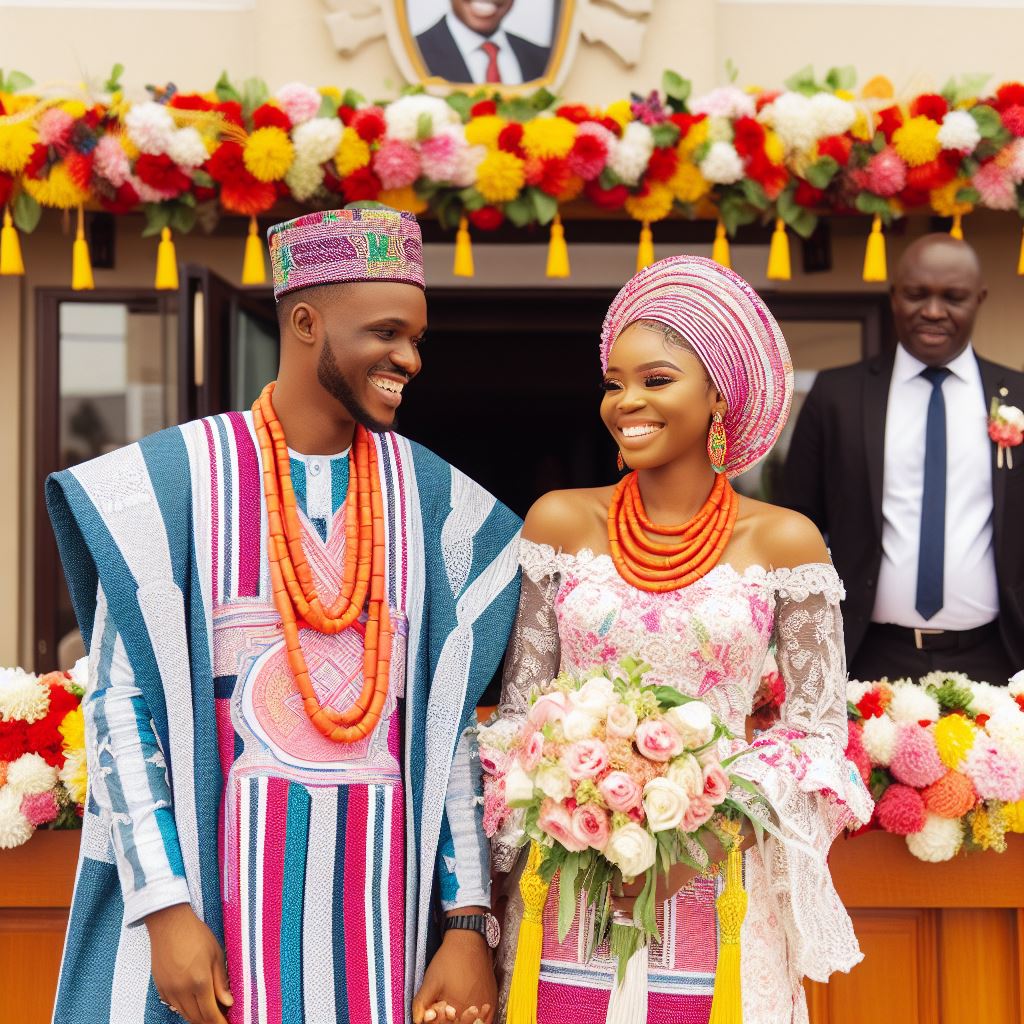Marital Contracts and Agreements: Insights from Nigeria’s Marriage Act
Last Updated on January 28, 2024
Introduction
Brief Overview of the Topic
Marital contracts in Nigeria are crucial.
These legal documents determine the rights and obligations of spouses.
Nigeria’s Marriage Act provides the legal framework for these contracts.
It is essential to comprehend its intricacies.
This blog post delves into the intricacies of marital contracts in Nigeria by examining the Marriage Act’s provisions.
Importance of Understanding Marital Contracts and Agreements
Understanding marital contracts is vital.
It empowers individuals to safeguard their interests in marital relationships.
By knowing the Marriage Act’s nuances, couples can make informed decisions about their contractual agreements.
Thesis Statement: Exploring the Insights from Nigeria’s Marriage Act
This blog post explores the profound insights offered by Nigeria’s Marriage Act regarding marital contracts.
It unravels the legal intricacies and their implications.
Read: Rights and Duties of Spouses under Nigeria’s Marriage Act
Marital Contracts and Agreements
Definition and purpose
Marital contracts and agreements are legally binding agreements entered into by spouses in Nigeria.
The purpose is to establish the rights, responsibilities, and obligations of each party during marriage.
Types of marital contracts and agreements
- Prenuptial agreements: signed before marriage to define how assets will be divided in case of divorce.
- Postnuptial agreements: signed after marriage to outline the division of assets in case of divorce or death.
- Cohabitation agreements: entered into by unmarried couples living together to address financial matters and property rights.
Key elements usually covered
- Division of assets: specifies how property, investments, and debts will be divided in case of divorce or death.
- Spousal support: determines the financial assistance one spouse may provide to the other after separation or divorce.
- Child custody and support: addresses arrangements for the care, custody, and financial support of children, if applicable.
- Alimony: outlines the monetary payments one spouse may provide to the other after divorce or separation.
- Inheritance rights: states how assets will be distributed among the spouses and their children upon death.
- Dispute resolution methods: outlines the processes to resolve conflicts, such as mediation or arbitration.
Importance of legal representation and counseling during the process
- Legal representation ensures that each party’s rights are protected and that the agreement is fair and enforceable.
- Counseling provides emotional support, helps couples understand the implications of the agreement, and promotes communication.
By having clear and legally binding agreements, couples can secure their financial futures and protect their rights.
Read: Annulments, Divorce, and the Marriage Act in Nigeria: Key Insights
Nigeria’s Marriage Act
Overview of Nigeria’s Marriage Act
Nigeria’s Marriage Act, a significant legal framework, governs the solemnization of marriages in the country.
Purposes and objectives of the act
- Promote uniformity: The Act ensures a consistent legal basis for marriages nationwide.
- Safeguard rights: It safeguards the rights and interests of spouses and their dependents.
Relevant sections regarding marital contracts and agreements
Section 33: Marriage Settlements and Separation Agreements
- Empowers couples to create marriage settlements.
- Allows for separation agreements in cases of marital discord.
34th Section: Registration of Settlements and Agreements
- Mandates registration of marriage settlements.
- Enforces the binding nature of registered agreements.
Section 35: Enforcement of Settlements and Agreements
- Provides legal mechanisms for the enforcement of settlements.
- Ensures adherence to marital agreements.
Comparisons with other countries’ legislation on marital contracts
Similarities
- Like the UK and Canada, Nigeria’s Marriage Act permits prenuptial agreements.
- It emphasizes spousal protection, akin to South Africa’s legislation.
Differences
- Unlike the US, Nigeria requires the registration of marital contracts for enforcement.
- Nigerian law has specific provisions for customary and Islamic marriages, which differ from many Western countries.
Basically, Nigeria’s Marriage Act serves as a comprehensive legal framework for marriages, ensuring uniformity and protection of spousal rights.
It is both similar to and distinct from other countries’ marital contract legislation, reflecting the unique cultural and legal landscape of Nigeria.
Read: Marriage Vows 101: History, Meaning, and Custom

Gain More Insights: Inspirational Quotes on Marriage from Nollywood
Insights on Marital Contracts and Agreements in Nigeria
Cultural and traditional factors influencing the use of marital contracts
- Influence of family and societal expectations
- Belief in the sanctity of marriage without legal documentation
- Fear of jeopardizing the relationship by discussing prenuptial agreements
- Limited knowledge about the legal provisions of marital contracts in Nigeria
Advantages of utilizing marital contracts and agreements
- Clear definition of rights and responsibilities of both spouses
- Protection of individual assets acquired before and during the marriage
- Prevention of potential conflicts and disputes in the event of divorce
- Safeguarding the interests of children from previous relationships or marriages
Challenges and criticisms associated with marital contracts
- Societal stigmas surrounding the use of marital contracts
- Lack of awareness about the benefits and legal provisions of marital contracts
- Gender disparities in negotiating and enforcing marital contracts
- Societal stigmas: Society often perceives marital contracts as a lack of trust or commitment in the relationship.
- Lack of awareness: Many couples are unaware of the legal provisions and benefits of marital contracts.
- Gender disparities: Women may face more challenges in negotiating and enforcing marital contracts due to traditional gender roles.
Case studies or examples of successful marital contracts in Nigeria
- Example 1: A couple in Nigeria, both successful business owners, signed a marital contract that clearly outlined the division of assets and income in case of divorce. This contract not only protected their individual businesses but also ensured a fair settlement for both parties.
- Example 2: A Nigerian woman, after experiencing a difficult divorce in her previous marriage, decided to sign a marital contract with her new partner. This contract specified her right to keep custody of her child from the previous marriage and ensured financial support for the child’s upbringing.
Marital contracts and agreements in Nigeria offer couples the opportunity to protect their interests and plan for the future.
Despite cultural challenges and criticisms, more awareness and education about the benefits of marital contracts are necessary to empower individuals to make informed decisions.
Read: Benefits of Upgrading Customary Marriage to Statutory in Nigeria
Conclusion
Summary of key points discussed
In this blog post, we explored the topic of Marital Contracts and Agreements in Nigeria’s Marriage Act.
We discussed the importance of understanding these contracts and agreements as they provide legal protection and guidance for couples during their marriage.
Importance of understanding marital contracts and agreements in Nigeria
Understanding marital contracts and agreements in Nigeria is crucial as they outline the rights and responsibilities of each spouse, property distribution, and settlement of disputes.
This knowledge can help couples navigate their marriage and make informed decisions.
Encouragement for individuals to seek legal counsel and education
Given the complexity and legal significance of marital contracts and agreements, it is highly recommended for couples to seek legal counsel and education on the topic.
This will ensure that their rights are protected and they are aware of the legal implications of their decisions.
Closing remarks
Marital Contracts and Agreements play a vital role in Nigeria’s legal framework for marriages.
Understanding these contracts and seeking legal counsel can contribute to healthier and more informed marriages, providing couples with the necessary tools to navigate through challenges and protect their interests.


